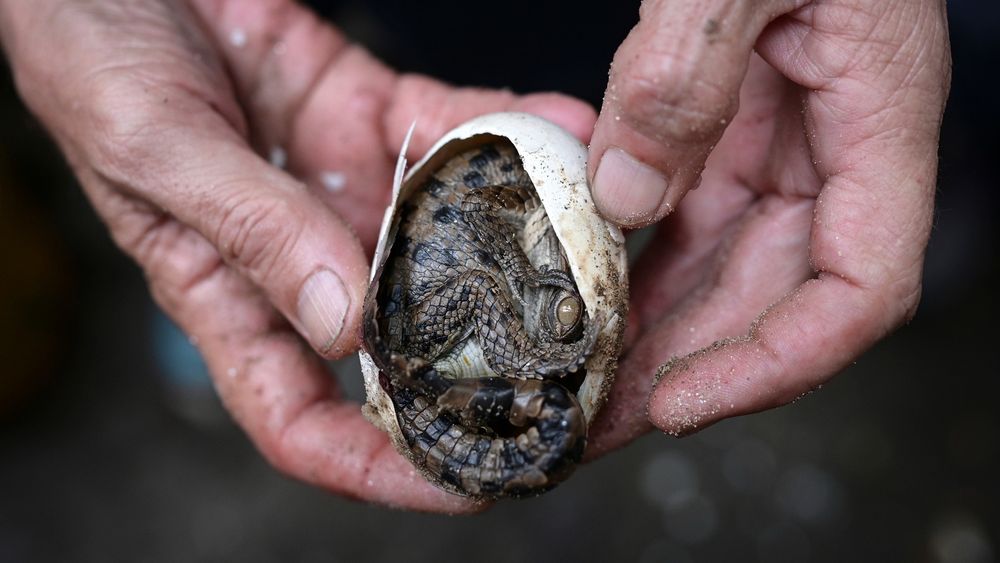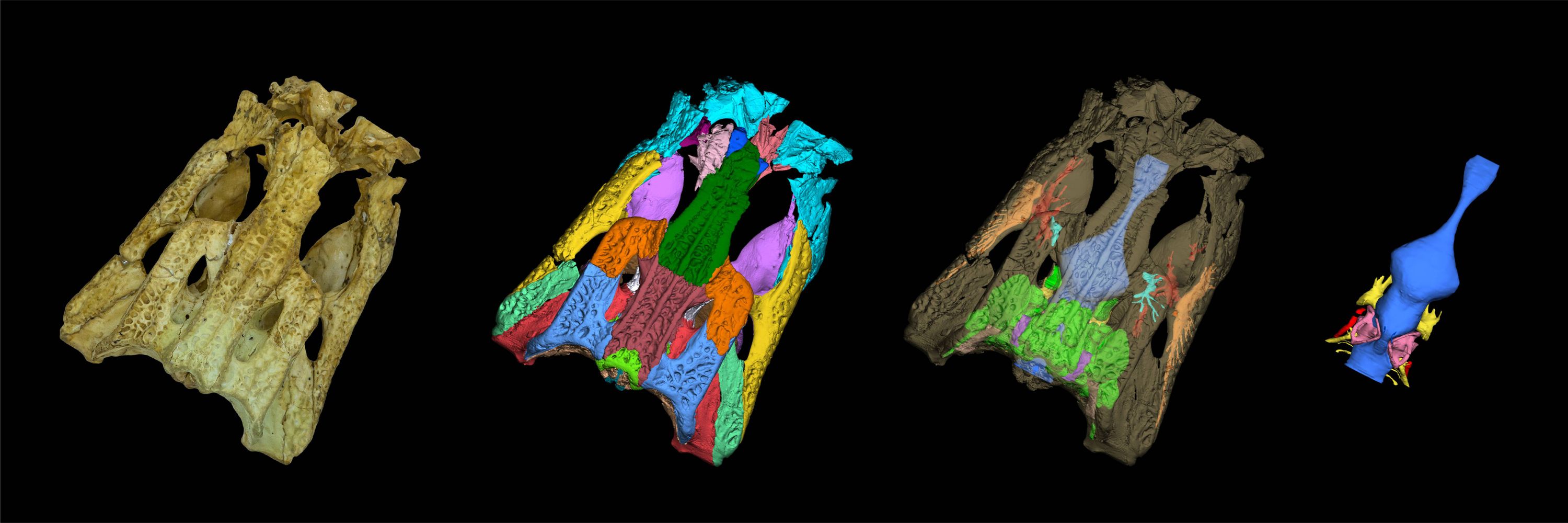
Jorgo Ristevski
@jorgoristevski.bsky.social
PhD in paleontology, specializing in crocodylomorph anatomy, taxonomy and evolution. Postdoc at Max Planck Institute of Geoanthropology. He/Him/His
Pinned




Hello Bluesky! My name is Jorgo Ristevski, and I am a paleontologist that studies crocodylomorphs.
Reposted by Jorgo Ristevski
Replica skeleton of Baru iylwenpeny on display at the Queensland Museum. This is part of the new Croc! exhibit. #MuseumCore #CrocQM

October 28, 2025 at 12:34 AM
Replica skeleton of Baru iylwenpeny on display at the Queensland Museum. This is part of the new Croc! exhibit. #MuseumCore #CrocQM
Reposted by Jorgo Ristevski
Happy #FossilFriday! Meet Paludirex, a BIG #crocodile from #Australia, one of many crocs coming from the Science Museum of Minnesota to @badweatherbrew.bsky.social for #CroctoberFest tomorrow (Sat, Sept 20)! We’ll be there 12-5pm with sooo much + I’m giving two talks, come raise a glass with us! 🐊🍺🐊




September 19, 2025 at 9:02 PM
Happy #FossilFriday! Meet Paludirex, a BIG #crocodile from #Australia, one of many crocs coming from the Science Museum of Minnesota to @badweatherbrew.bsky.social for #CroctoberFest tomorrow (Sat, Sept 20)! We’ll be there 12-5pm with sooo much + I’m giving two talks, come raise a glass with us! 🐊🍺🐊
Reposted by Jorgo Ristevski
For #Croctober Day 20 I want to shout out some fun etymology. To the left you see Paludirex, a large mekosuchine who's name means "swamp king". On the right is Gunggamarandu, which translates to "river boss".
Both have been named by Jorgo Ristevski
Art by Eleanor Pease
Both have been named by Jorgo Ristevski
Art by Eleanor Pease


October 20, 2025 at 5:43 PM
For #Croctober Day 20 I want to shout out some fun etymology. To the left you see Paludirex, a large mekosuchine who's name means "swamp king". On the right is Gunggamarandu, which translates to "river boss".
Both have been named by Jorgo Ristevski
Art by Eleanor Pease
Both have been named by Jorgo Ristevski
Art by Eleanor Pease
Reposted by Jorgo Ristevski
Confractosuchus and the unsupervized infant child it swallowed before dying

October 17, 2025 at 3:26 PM
Confractosuchus and the unsupervized infant child it swallowed before dying
Reposted by Jorgo Ristevski
Australia in the Anthropocene: Linking Past, Present and Future. Wonderful project workshop yesterday exploring the diverse methods our students and ECRs are using to examine how Australia's ecosystems have been shaped by people over the long-term and why it matters today.

October 16, 2025 at 1:06 AM
Australia in the Anthropocene: Linking Past, Present and Future. Wonderful project workshop yesterday exploring the diverse methods our students and ECRs are using to examine how Australia's ecosystems have been shaped by people over the long-term and why it matters today.
Reposted by Jorgo Ristevski
For #Croctober Day 11 we got Confractosuchus (art by Julius Csotonyi)
Confracto once inhabited the Winton Formation of Australia, but unlike the tiny Isisfordia was sizable enough to even feed on dinosaurs. Which we know because we found the bones of an elasmarian in its stomach
Confracto once inhabited the Winton Formation of Australia, but unlike the tiny Isisfordia was sizable enough to even feed on dinosaurs. Which we know because we found the bones of an elasmarian in its stomach

October 11, 2025 at 9:32 PM
For #Croctober Day 11 we got Confractosuchus (art by Julius Csotonyi)
Confracto once inhabited the Winton Formation of Australia, but unlike the tiny Isisfordia was sizable enough to even feed on dinosaurs. Which we know because we found the bones of an elasmarian in its stomach
Confracto once inhabited the Winton Formation of Australia, but unlike the tiny Isisfordia was sizable enough to even feed on dinosaurs. Which we know because we found the bones of an elasmarian in its stomach
Reposted by Jorgo Ristevski
#Croctober Day 6
Heres a fun one from a research history POV.
In 1997 researchers described a snout tip under the name Baru huberi and in 2016 skull elements were given the name Ultrastenos willisi
Only last year did we recognize that both fossils belonged to a single individual
Heres a fun one from a research history POV.
In 1997 researchers described a snout tip under the name Baru huberi and in 2016 skull elements were given the name Ultrastenos willisi
Only last year did we recognize that both fossils belonged to a single individual

October 6, 2025 at 6:27 PM
#Croctober Day 6
Heres a fun one from a research history POV.
In 1997 researchers described a snout tip under the name Baru huberi and in 2016 skull elements were given the name Ultrastenos willisi
Only last year did we recognize that both fossils belonged to a single individual
Heres a fun one from a research history POV.
In 1997 researchers described a snout tip under the name Baru huberi and in 2016 skull elements were given the name Ultrastenos willisi
Only last year did we recognize that both fossils belonged to a single individual
Reposted by Jorgo Ristevski
📣Editor spotlight
Dr Jorgo Ristevski is an early career palaeontologist that studies crocodyliforms. He researches the extinct crocodylian clade Mekosuchinae. He has named and described several extinct crocodyliform genera and species, including Australia's giant gavialoid Gunggamarandu maunala 🐊
Dr Jorgo Ristevski is an early career palaeontologist that studies crocodyliforms. He researches the extinct crocodylian clade Mekosuchinae. He has named and described several extinct crocodyliform genera and species, including Australia's giant gavialoid Gunggamarandu maunala 🐊

September 24, 2025 at 1:09 PM
📣Editor spotlight
Dr Jorgo Ristevski is an early career palaeontologist that studies crocodyliforms. He researches the extinct crocodylian clade Mekosuchinae. He has named and described several extinct crocodyliform genera and species, including Australia's giant gavialoid Gunggamarandu maunala 🐊
Dr Jorgo Ristevski is an early career palaeontologist that studies crocodyliforms. He researches the extinct crocodylian clade Mekosuchinae. He has named and described several extinct crocodyliform genera and species, including Australia's giant gavialoid Gunggamarandu maunala 🐊
Reposted by Jorgo Ristevski
- A hungry adult female Iberosuchus sp. tries her luck ambushing a small Diplocynodon on a river bank -
Created for the latest @paleologica.bsky.social video
Created for the latest @paleologica.bsky.social video
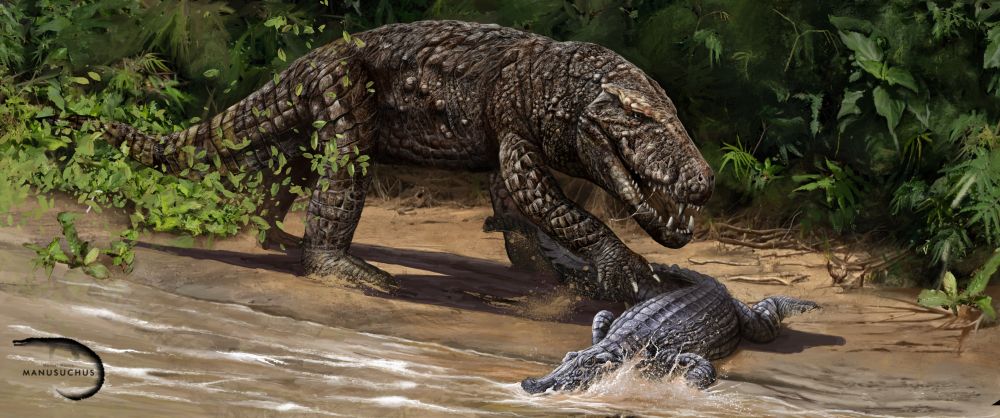
August 14, 2025 at 9:57 AM
- A hungry adult female Iberosuchus sp. tries her luck ambushing a small Diplocynodon on a river bank -
Created for the latest @paleologica.bsky.social video
Created for the latest @paleologica.bsky.social video
Reposted by Jorgo Ristevski
CRACK!
Razanandrongobe easily crushes a dinosaur's femur to feed from its nutritious marrow
If Barinasuchus' skull rivaled the size of a Daspletosaurus, this crocodyliform's skull rivaled the size of a T. rex, and was arguably more specialized for bone-cracking
#paleoart
Razanandrongobe easily crushes a dinosaur's femur to feed from its nutritious marrow
If Barinasuchus' skull rivaled the size of a Daspletosaurus, this crocodyliform's skull rivaled the size of a T. rex, and was arguably more specialized for bone-cracking
#paleoart
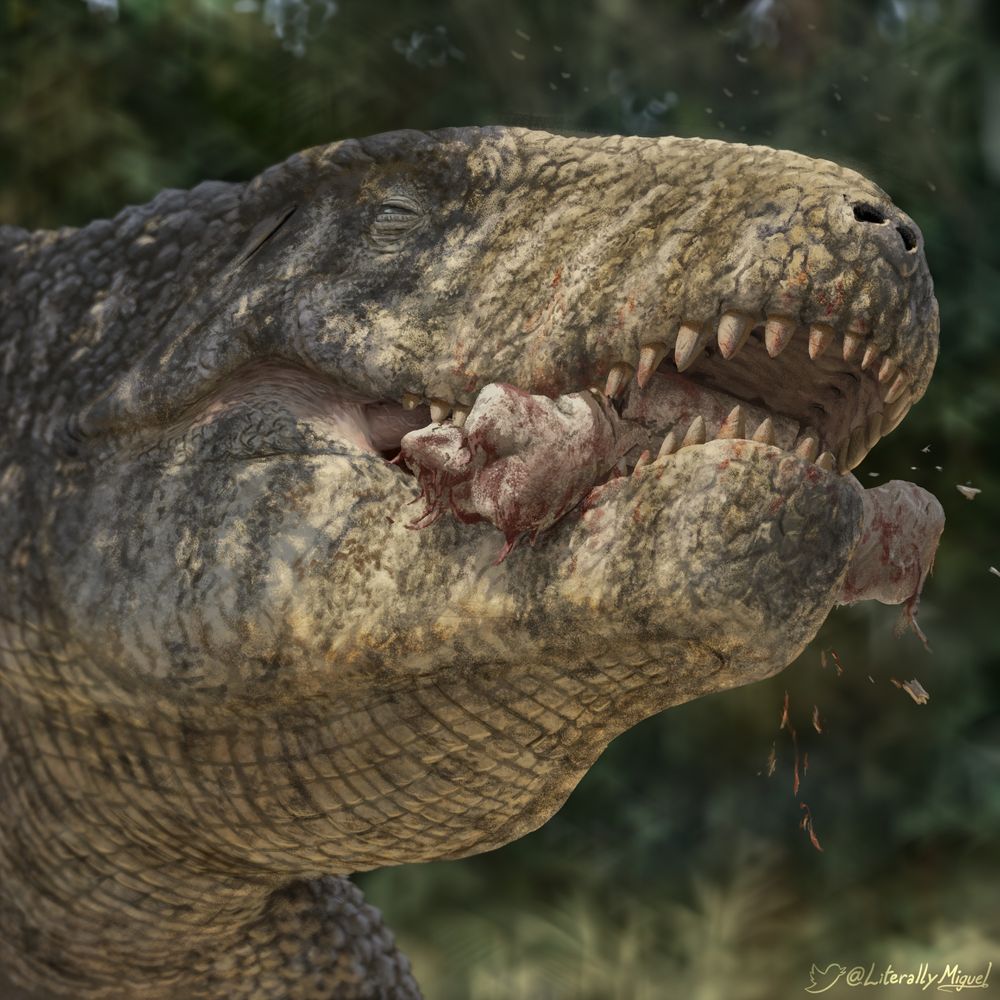
June 17, 2025 at 5:37 AM
CRACK!
Razanandrongobe easily crushes a dinosaur's femur to feed from its nutritious marrow
If Barinasuchus' skull rivaled the size of a Daspletosaurus, this crocodyliform's skull rivaled the size of a T. rex, and was arguably more specialized for bone-cracking
#paleoart
Razanandrongobe easily crushes a dinosaur's femur to feed from its nutritious marrow
If Barinasuchus' skull rivaled the size of a Daspletosaurus, this crocodyliform's skull rivaled the size of a T. rex, and was arguably more specialized for bone-cracking
#paleoart
New paper published today by @weisbeckerbblab.bsky.social and a big group of incredible collaborators! It has been a great honour to contribute to this study and be part of the Ozboneviz team.
Today we’re publishing Ozboneviz, an open-access 3D atlas of Australian vertebrate (mostly mammal) bones: doi.org/10.1093/bios...
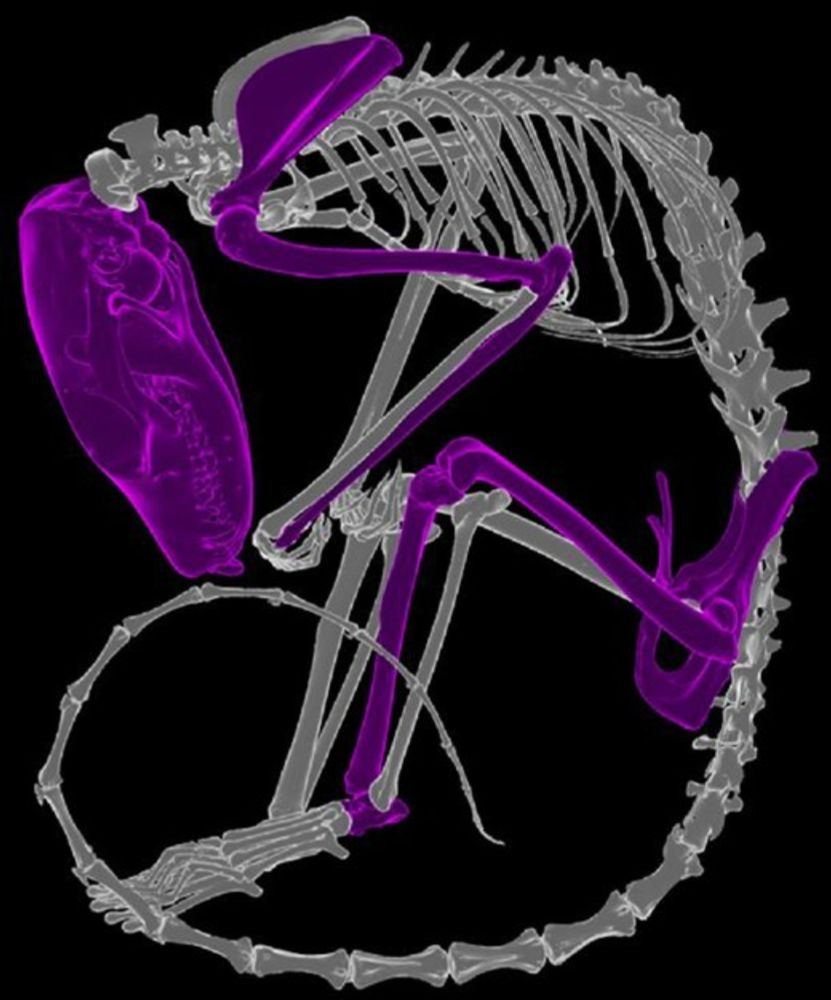
Ozboneviz: an Australian precedent in FAIR 3D imagery and extended biodiversity collections
Abstract. Billions of specimens are in biodiversity collections worldwide, and this infrastructure is crucial for research on Earth's natural history. Thre
doi.org
June 11, 2025 at 6:28 AM
New paper published today by @weisbeckerbblab.bsky.social and a big group of incredible collaborators! It has been a great honour to contribute to this study and be part of the Ozboneviz team.
Reposted by Jorgo Ristevski
Reposted by Jorgo Ristevski
#FossilFriday For our first social media posts, we highlight the iconic MB.Av.1010: a complete fossil of Archaeopteryx siemensii; a Late Jurassic species thought to be transitional between theropod dinosaurs & birds.
On display at the Berlin Natural History Museum.
On display at the Berlin Natural History Museum.
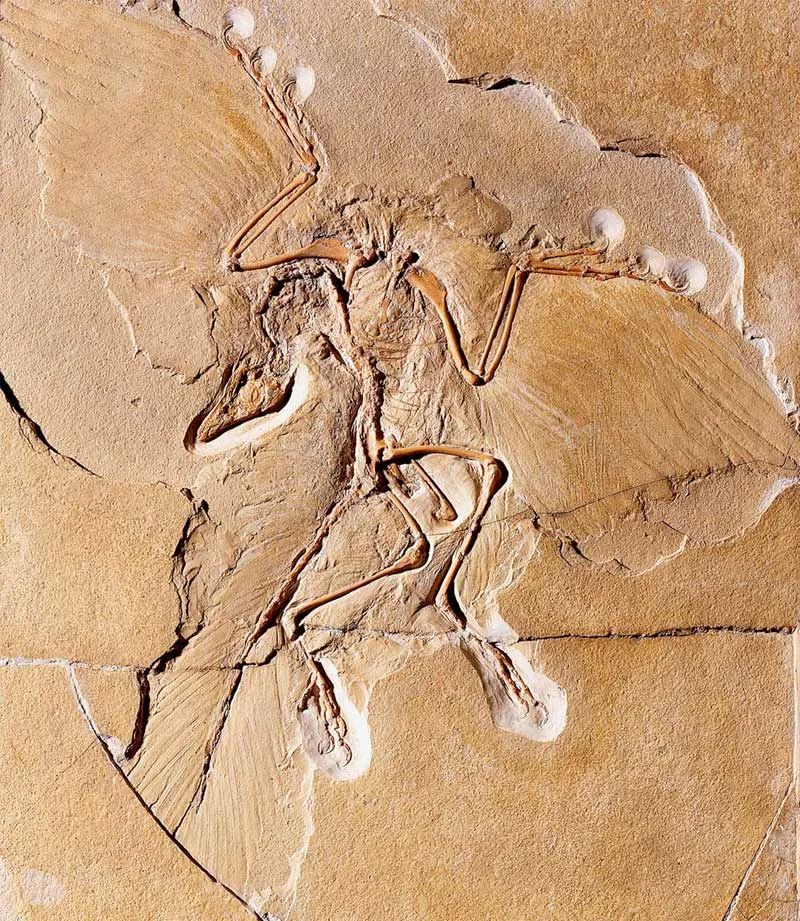
February 28, 2025 at 12:00 PM
#FossilFriday For our first social media posts, we highlight the iconic MB.Av.1010: a complete fossil of Archaeopteryx siemensii; a Late Jurassic species thought to be transitional between theropod dinosaurs & birds.
On display at the Berlin Natural History Museum.
On display at the Berlin Natural History Museum.
Reposted by Jorgo Ristevski
They’ve only waited 120Ma.
A new glimpse into theropod diversity from Early Cretaceous Australia: megaraptorids, an unenlagiine, and for the first time, carcharodontosaurians.
Read it here: tandfonline.com/doi/full/10....
Artwork by Jonathan Metzger.
1/10
A new glimpse into theropod diversity from Early Cretaceous Australia: megaraptorids, an unenlagiine, and for the first time, carcharodontosaurians.
Read it here: tandfonline.com/doi/full/10....
Artwork by Jonathan Metzger.
1/10
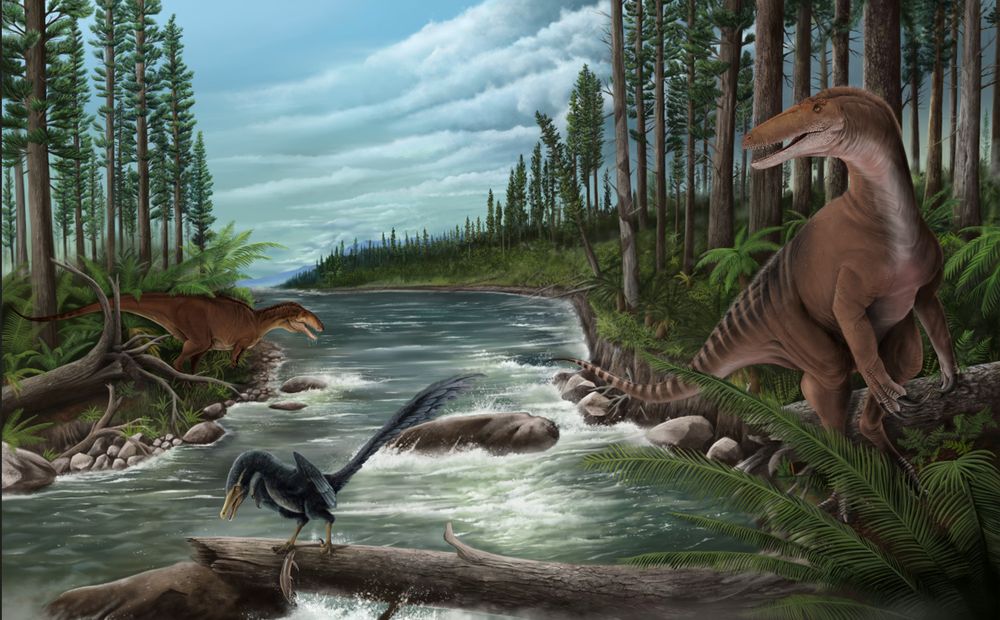
February 19, 2025 at 7:51 PM
They’ve only waited 120Ma.
A new glimpse into theropod diversity from Early Cretaceous Australia: megaraptorids, an unenlagiine, and for the first time, carcharodontosaurians.
Read it here: tandfonline.com/doi/full/10....
Artwork by Jonathan Metzger.
1/10
A new glimpse into theropod diversity from Early Cretaceous Australia: megaraptorids, an unenlagiine, and for the first time, carcharodontosaurians.
Read it here: tandfonline.com/doi/full/10....
Artwork by Jonathan Metzger.
1/10
Reposted by Jorgo Ristevski
- Voay robustus -
Commission I made for a very nice guy last week. If someone wants to commission me, Im open, as we say in Spain: Bueno, bonito y barato.
Commission I made for a very nice guy last week. If someone wants to commission me, Im open, as we say in Spain: Bueno, bonito y barato.

February 11, 2025 at 9:19 PM
- Voay robustus -
Commission I made for a very nice guy last week. If someone wants to commission me, Im open, as we say in Spain: Bueno, bonito y barato.
Commission I made for a very nice guy last week. If someone wants to commission me, Im open, as we say in Spain: Bueno, bonito y barato.
Reposted by Jorgo Ristevski
Check out our latest paper validating telencephalon and cerebellum endocast measurements in birds 🐦🦅🦆🦃🪿🐦⬛ royalsocietypublishing.org/doi/10.1098/... @evolsara.bsky.social @evoneuro.bsky.social

Avian telencephalon and cerebellum volumes can be accurately estimated from digital brain endocasts | Biology Letters
For studies of the evolution of vertebrate brain anatomy and potentially associated
behaviours, reconstructions of digital brain endocasts from computed tomography scans
have revolutionized our capaci...
royalsocietypublishing.org
January 22, 2025 at 6:36 AM
Check out our latest paper validating telencephalon and cerebellum endocast measurements in birds 🐦🦅🦆🦃🪿🐦⬛ royalsocietypublishing.org/doi/10.1098/... @evolsara.bsky.social @evoneuro.bsky.social
Reposted by Jorgo Ristevski




December 18, 2024 at 8:27 PM
Reposted by Jorgo Ristevski
In the Late Triassic, croc relatives took on a broader array of forms and ecological roles than dinosaurs. The largest carnivores, for example, were big croc relatives like our chompy friend Fasolasuchus here. This life-size model is on display at Parque Nacional Talampaya, Argentina. 🧪

December 13, 2024 at 1:56 PM
In the Late Triassic, croc relatives took on a broader array of forms and ecological roles than dinosaurs. The largest carnivores, for example, were big croc relatives like our chompy friend Fasolasuchus here. This life-size model is on display at Parque Nacional Talampaya, Argentina. 🧪
Reposted by Jorgo Ristevski
Lately I've been more focused on sculpting than 2D , but I felt like doing something fast to keep practice going.
A Mekosuchinae indet. inspired by the latest study on its presence in Papua New Guinea.
I really need to refocus on painting man.
#crocodilia
A Mekosuchinae indet. inspired by the latest study on its presence in Papua New Guinea.
I really need to refocus on painting man.
#crocodilia

December 9, 2024 at 10:18 PM
Lately I've been more focused on sculpting than 2D , but I felt like doing something fast to keep practice going.
A Mekosuchinae indet. inspired by the latest study on its presence in Papua New Guinea.
I really need to refocus on painting man.
#crocodilia
A Mekosuchinae indet. inspired by the latest study on its presence in Papua New Guinea.
I really need to refocus on painting man.
#crocodilia
Reposted by Jorgo Ristevski
A year or so ago, @zieglertn.bsky.social notified me that they've come across a fossil #thylacine from one of the caves in eastern Victoria - a BIG one. After hours of delicate prep work, I got to take a look at the beast (though apparently not take great photos... ).


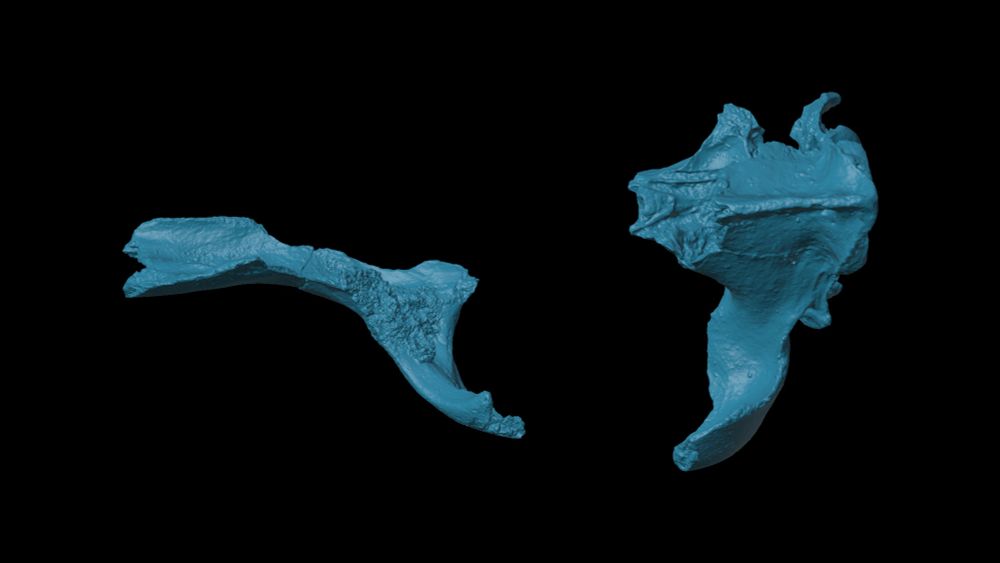
December 4, 2024 at 10:54 PM
A year or so ago, @zieglertn.bsky.social notified me that they've come across a fossil #thylacine from one of the caves in eastern Victoria - a BIG one. After hours of delicate prep work, I got to take a look at the beast (though apparently not take great photos... ).
Reposted by Jorgo Ristevski
Finished with one of the commissions I have been working on, the Australian Pleistocene crocodilian Quinkana fortirostrum.The commissioner requested the animal be reconstructed emphasising its terrestrial nature, though how terrestrial this animal actually was is debated.

January 4, 2024 at 1:01 AM
Finished with one of the commissions I have been working on, the Australian Pleistocene crocodilian Quinkana fortirostrum.The commissioner requested the animal be reconstructed emphasising its terrestrial nature, though how terrestrial this animal actually was is debated.
Reposted by Jorgo Ristevski
New croc paper alert! 🐊🚨
In this new study led by my friend and colleague Thiago Fachini, we reassessed the cranial morphology and phylogenetic position of Barreirosuchus franciscoi, a peirosaurian from the Late Cretaceous of Brazil.
anatomypubs.onlinelibrary.wiley.com/doi/10.1002/...
In this new study led by my friend and colleague Thiago Fachini, we reassessed the cranial morphology and phylogenetic position of Barreirosuchus franciscoi, a peirosaurian from the Late Cretaceous of Brazil.
anatomypubs.onlinelibrary.wiley.com/doi/10.1002/...

December 2, 2024 at 7:35 PM
New croc paper alert! 🐊🚨
In this new study led by my friend and colleague Thiago Fachini, we reassessed the cranial morphology and phylogenetic position of Barreirosuchus franciscoi, a peirosaurian from the Late Cretaceous of Brazil.
anatomypubs.onlinelibrary.wiley.com/doi/10.1002/...
In this new study led by my friend and colleague Thiago Fachini, we reassessed the cranial morphology and phylogenetic position of Barreirosuchus franciscoi, a peirosaurian from the Late Cretaceous of Brazil.
anatomypubs.onlinelibrary.wiley.com/doi/10.1002/...





